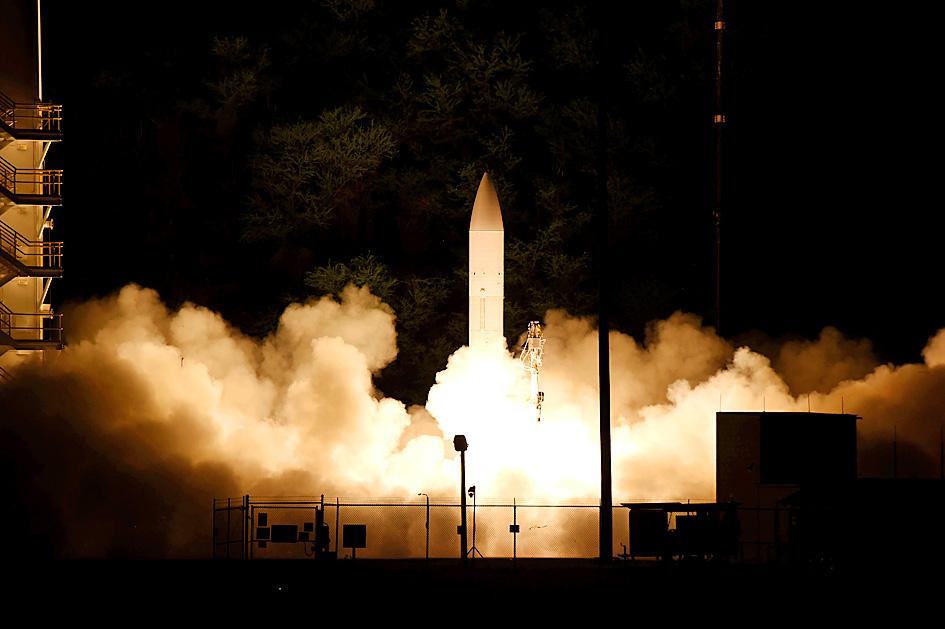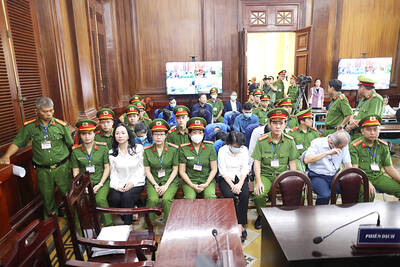A flight test of a hypersonic missile system in Hawaii on Wednesday ended in failure due to a problem that occurred after ignition, the US Department of Defense said, delivering a fresh blow to a program that has experienced stumbles.
It did not provide details of what took place in the test, but said in an e-mailed statement that “the department remains confident that it is on track to field offensive and defensive hypersonic capabilities on target dates beginning in the early 2020s.”
“An anomaly occurred following ignition of the test asset,” Pentagon spokesman US Navy Lieutenant Commander Tim Gorman said in the statement.

Photo: AFP / US Navy / Oscar Sosa
“Program officials have initiated a review to determine the cause to inform future tests.” he said. “While the department was unable to collect data on the entirety of the planned flight profile, the information gathered from this event will provide vital insights.”
The trial marked the second unsuccessful test flight of the prototype weapon known as Conventional Prompt Strike.
There was a booster failure in its first flight test in October last year, which prevented the missile from leaving the launch pad. The weapon is envisioned to be installed on Zumwalt-class destroyers and Virginia-class submarines.
The US Army is developing a land-based version. Lockheed Martin and Northrop Grumman are the top contractors.
The Pentagon is feeling pressure to deploy hypersonic systems as rivals including Russia, China and North Korea are pressing ahead with the systems designed to evade interception by flying at more than five times the speed of sound and gliding on a maneuverable path to deliver nuclear warheads.
China is investing heavily in hypersonic weapons, putting one in orbit in July last year that flew 40,000km in more than 100 minutes of flight, the US military said.
In January, North Korea conducted two separate launches of hypersonic missile systems that traveled several hundred kilometers.
Russia debuted a hypersonic air-to-ground missile in its attack on Ukraine.
Adversaries do not have to meet the rigorous standards set under the US defense acquisition system or face public scrutiny over delays and failure.
The slower pace of US hypersonic programs prompted a number of heated exchanges when US Secretary of Defense Lloyd Austin testified in April before the US House of Representatives Armed Services Committee.
“You recently called in the defense industrial community that were involved in the hypersonics development as to how we can speed that up,” US Representative Mike Turner said. “We’re behind our adversaries.”
Without denying that, Austin said that “we have to be careful” because “hypersonic is a capability, sir, but it’s not the only capability.”
“I have engaged industry” to “make sure that they’re leaning into” hypersonic development, he added.

Republican US lawmakers on Friday criticized US President Joe Biden’s administration after sanctioned Chinese telecoms equipment giant Huawei unveiled a laptop this week powered by an Intel artificial intelligence (AI) chip. The US placed Huawei on a trade restriction list in 2019 for contravening Iran sanctions, part of a broader effort to hobble Beijing’s technological advances. Placement on the list means the company’s suppliers have to seek a special, difficult-to-obtain license before shipping to it. One such license, issued by then-US president Donald Trump’s administration, has allowed Intel to ship central processors to Huawei for use in laptops since 2020. China hardliners

A top Vietnamese property tycoon was on Thursday sentenced to death in one of the biggest corruption cases in history, with an estimated US$27 billion in damages. A panel of three hand-picked jurors and two judges rejected all defense arguments by Truong My Lan, chair of major developer Van Thinh Phat, who was found guilty of swindling cash from Saigon Commercial Bank (SCB) over a decade. “The defendant’s actions ... eroded people’s trust in the leadership of the [Communist] Party and state,” read the verdict at the trial in Ho Chi Minh City. After the five-week trial, 85 others were also sentenced on

DISADVANTAGE: Erin O’Toole, who led the Conservatives during the election campaign in 2021, estimated that the interference cost his party as many as nine legislative seats Canada’s domestic spy agency on Monday concluded that China interfered in the past two elections, an official probe heard, the firmest evidence so far of suspected Chinese meddling in Canadian politics. Canadian Prime Minister Justin Trudeau’s Liberal Party won both the elections, held in 2019 and 2021. Under pressure from opposition lawmakers unhappy about media reports on China’s possible role, Trudeau set up a commission into foreign interference. The commission was shown a slide on Monday containing an extract of a briefing in February last year from the Canadian Security Intelligence Service (CSIS). “We know that the PRC [People’s Republic of China] clandestinely

‘DELUSIONAL’: Targeting the families of Hamas’ leaders would not push the group to change its position or to give up its demands for Palestinians, Ismail Haniyeh said Israeli aircraft on Wednesday killed three sons of Hamas’ top political leader in the Gaza Strip, striking high-stakes targets at a time when Israel is holding delicate ceasefire negotiations with the militant group. Hamas said four of the leader’s grandchildren were also killed. Ismail Haniyeh’s sons are among the highest-profile figures to be killed in the war so far. Israel said they were Hamas operatives, and Haniyeh accused Israel of acting in “the spirit of revenge and murder.” The deaths threatened to strain the internationally mediated ceasefire talks, which appeared to gain steam in recent days even as the sides remain far